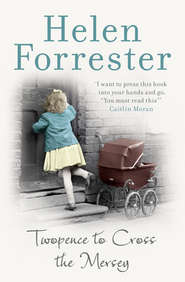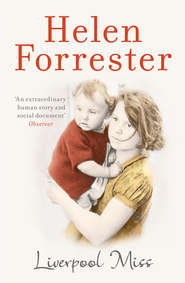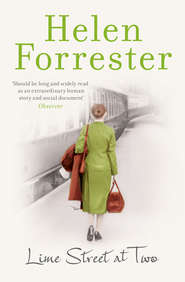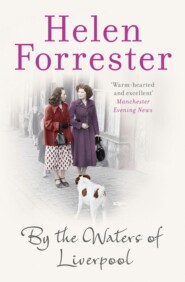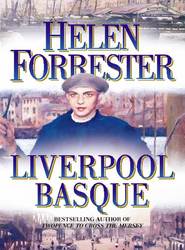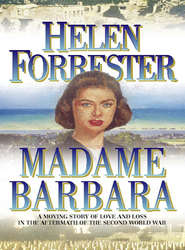По всем вопросам обращайтесь на: info@litportal.ru
(©) 2003-2024.
✖
The Complete Helen Forrester 4-Book Memoir: Twopence to Cross the Mersey, Liverpool Miss, By the Waters of Liverpool, Lime Street at Two
Настройки чтения
Размер шрифта
Высота строк
Поля
Mother said in a flat tone of voice, ‘There is nothing to do. She must go as she is. She has no other garments than those she has on – and I cannot wash her in cold water in her present state.’
So Fiona went to a huge hospital on the farther outskirts of the city, without benefit of bath, tooth-brush or nightgown, and my poor, crushed mother suffered the indignity of seeing her almost unconscious child stripped of her clothes and plunged into a disinfecting bath, her head rolling on her neck as the probationers washed her crawling hair. The tattered clothes were rolled into a bundle and handed to Mother, with the curt information that she could wait.
Mother was used to waiting – she spent her days in office and shop waiting-rooms as she applied for job after job with hordes of other applicants. Finally, about three in the morning a night nurse remembered that she was still there and told her she could go.
‘I want to know what is the matter with the child and I want to see her, now she is in bed.’
‘You will have to come on visiting days. Your doctor will be informed regarding her illness, and he will tell you.’
My mother lifted her hand to slap this inhuman automaton, but she was afraid of what might happen to Fiona if she made a fuss of any kind, so she turned slowly into the long, brown corridor to the front door.
She had come to the hospital with Fiona in the ambulance. Nobody had considered how she was to get home again. Outside was the dark and bitter cold of a February night.
She paused on the step, shaken by the knowledge that the only way to get home was to walk the seven miles to our part of the city. She was not even sure of the route.
The city was completely quiet and, emboldened by this, she set out, following the tram lines which glimmered in the gaslight. The freezing wind cut into her and, after a couple of miles, she was so cold that she was staggering in a ragged line along the pavement.
A dim light at a corner attracted her attention. It was a telephone box, and she quickened her step and sought refuge inside it.
Paralysed with cold, she stood there looking dully at the receiver on its hook, the telephone book hanging below it, and at two buttons marked ‘A’ and ‘B’. Idly, she read the instructions for making a call.
‘Insert two pennies. When the telephone is answered press Button A If no reply, press button B for the return of the twopence.’
Return of the twopence!
She hopefully pressed Button B.
Nothing happened, so, after a few minutes, she started again on her long hike homewards. An early tram rumbled past her, its lights flashing as it pitched and tossed its way along the lines.
When she reached the next public telephone box, she entered it and, without much hope, pressed Button B, and was immediately rewarded by the happy rattle of two falling pennies. She snatched them up and took the next tram home.
Father and I had waited up for her and were frantic with anxiety. Our anxiety turned to fury when we heard of the discourteous treatment she had received, and we did our best to comfort her before managing to get her to go to bed.
Our visits to the sanatorium were strictly regulated by whether we could find a telephone box where someone had forgotten to press Button B for the return of their twopence – and it was remarkable how many we found.
Though Fiona’s illness was long and our public assistance was reduced by the amount given for her maintenance, we were not altogether sorry. She was at least fed in hospital – great hunks of bread and margarine, bowls of sugarless porridge, meat stews, boiled puddings and steamed fish. Patients were expected to augment the hospital’s food by supplying their own sugar, jam, cake and fruit. We had nothing to bring Fiona. The diet was, however, so much better than she had received for many a month that, once the pleurisy was drained, she began to look much stronger.
She was sorely troubled by bugs in the hospital bed. Father complained, and was told roughly that she must have brought them in with her.
‘She was stripped and bathed when she came in,’ he said. ‘Perhaps the bed could be stoved.’
A ferocious female, who looked as if she had been put through a starch solution with her uniform, said cruelly, ‘Of course, it will be stoved – after your child is discharged.’
Father’s expression, after that remark, was like that in the painting of Christ crucified which hung over my grandmother’s bed. He bowed his head and turned silently away.
A slightly plumper waif of a child was returned to us six weeks later. There was no ambulance this time and she found the long tram ride a sore trial. She came home to again face hunger and cold with us.
‘The spring is coming,’ we comforted her.
The studied rudeness with which every member of the family was faced whenever dealing with officialdom, as personified by the public assistance committee, by the labour exchanges, by the voluntary agencies working in the city, was a revelation to us. We began to understand, as never before, the great gulf between rich and poor, between middle class and labour. It considerably improved our manners towards our less fortunate neighbours.
When I grew up, I told myself, I would do some kind of work which would improve this situation and make it possible for people to be helped without at the same time humiliating them.
When I grew up!
But I was growing up. Even in my pinched body, changes were taking place which indicated that soon I would be a young woman. A ghastly, ugly, uneducated wreck of a young woman but still a woman.
As I sat on the doorstep in the weak April sunshine, Edward on my knee, I wondered what would become of me. Other girls went to school and then to work, but for me life had stopped in one place on my first day in Liverpool. The other children were getting at least a basic education; Alan talked hopefully of Tony and Brian being able to win scholarships to grammar school; he himself was too old to sit the examination, but he worked hard at school and read a lot afterwards. At fourteen, he could leave school and he hoped to get a job ‘with a future’. Fiona, I thought, would sooner or later marry well – she was so pretty; I did not consider how, in this wilderness of slum, she would manage to do that.
Avril, throwing her weight about both physically and verbally, amongst a number of small girls from neighbouring houses, was tough enough to take care of herself, and Edward, watching the world go by from the safe refuge of my lap, was young enough not to have to worry.
Without an education, I saw myself being kept at home until my parents died and then becoming some bad-tempered old lady’s companion-help, subject always to the whims and fancies of others. I knew I was far too plain ever to hope for marriage.
I laid my cheek on little Edward’s scurvy head and decided that such a life was not worth living.
CHAPTER TWENTY-TWO (#ulink_7c7d4862-0f84-5a66-86fa-55a5701849c8)
Encouraged by the friendly old gentleman on the park bench, I continued to read. When I explained to him that I ought to be in school, he said firmly and wisely that it was my parents’ responsibility. He pointed out that, in studying by myself, I was following in the footsteps of many great Lancastrians, who, though doomed to poverty because they were weavers and caught up in the industrial revolution, found means to study and outshine their better-educated contemporaries. He cited the examples of John Butterworth, the mathematician from Haggate, who never earned more than fifteen shillings a week and learned to read and write at the age of twenty. Such was his love of learning that he became one of the finest geometricians of his day; and James Crowther and Richard Buxton, the Manchester botanists, both self-taught, both always poor, both famous.
I sighed. There was no help there. I wanted to eat and be warm every day of my life.
Avril and I had discovered one beautifully warm spot in Liverpool, although it was rather a long way from home. Sefton Park had a fine glass palm-house, which was kept at tropical temperatures to encourage the growth of the palms and similar plants inside. Avril, Edward and I used to go into it often and crawl under the great creepers to get warm, emerging later with our bottoms covered with earth, damper but warmer.
Once we were discovered by two earnest young men carrying notebooks and pencils. They were wreathed around with long scarves in the colours of the university, and when they found us they were at first puzzled and then amused.
Avril and I stared at them like a pair of scared rabbits.
‘Hide and seek?’ one young man inquired.
I nodded assent, and, like fellow conspirators, they rearranged the foliage over us and tiptoed away. A gardener on another occasion was not so kind.
‘We don’t want no dirty ragamuffins in here,’ he shouted, and sent us packing.
Crestfallen, we stalked out of the glass house with what dignity we could muster, and I pushed the Chariot homeward, passing through a working-class shopping street on the way.
Halfway up the street, I came to a large, red brick building surrounded by a matching brick wall. It was an elementary school, silent and deserted because it was Saturday. I was about to pass it without much interest, when the remains of a poster flapping in the wind caught my attention. It announced the opening of evening school the previous September. Courses in commercial arithmetic, bookkeeping, English, shorthand and several other subjects were offered.
I stopped.
I had never heard of evening school and I could hardly believe that one could go to school outside the normal hours. I could have skipped for joy.
I wondered if one could enroll at times other than September. Perhaps there would be someone on the premises who could tell me about it. I wheeled the Chariot through the gate leading to the school yard and was hesitantly moving round the building searching for a door, when a hoarse voice shouted, ‘What the hell do you think you’re doing?’
The voice came from an upper window, where a bald man in shirt sleeves, holding a duster he had apparently been shaking, was looking down at me. His expression was hostile, and I wilted.
‘I – I was looking for someone to ask about evening school,’ I stuttered.
My questioner looked pained.






